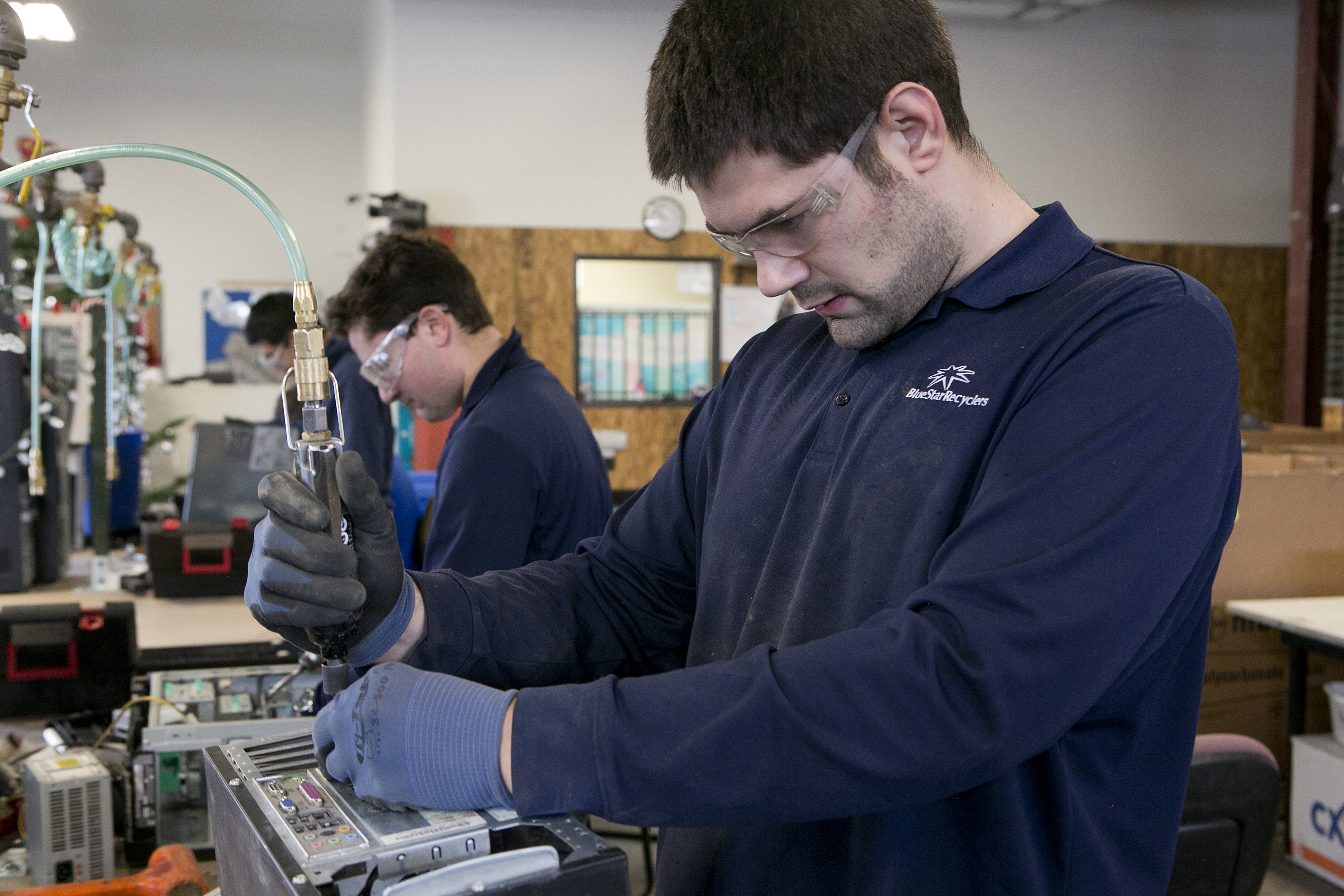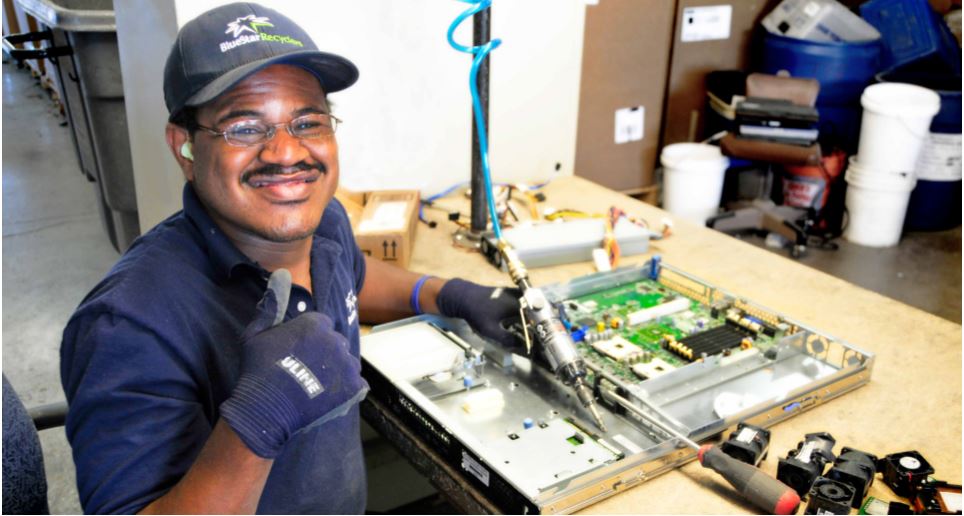
Sustainability showcase: Erase the e-waste
It takes a lot of computers, cell phones and other gizmos to run one of the largest water utilities in the West. And when those items need to be replaced, it creates a lot of potential waste.
But Denver Water is on the case.
In 2018, we recycled more than 9 tons of electronic waste, dubbed e-waste for short.
Even better, Denver Water employees found a second life for hundreds of computers and other equipment. And we’re taking steps to reduce our consumption and disposal of electronics altogether.
“Curbing our e-waste volumes is a key focus of our sustainability efforts,” said Kate Taft, Denver Water’s sustainability manager. “As a large organization that relies heavily on technology, we feel a special obligation to responsibly manage e-waste and find ways to reduce its generation in the first place.”
It’s also a fiscally responsible approach that reduces our operations costs in a variety of ways.
Electronic waste presents one of the thorniest problems for sustainability advocates.
Technology improves rapidly, often accelerating the need to replace existing equipment. Recycling electronic waste is labor-intensive and costly. And if disposed of improperly, the tangle of metals and plastic can make for a toxic mess.
Tackling the e-waste problem is part of our larger dedication to the environment. Denver Water is well-known for promoting water conservation and efficiency, but our sustainable practices also extend to cutting waste, saving energy and reducing emissions.
At TAP, we’re bringing you updates on these important efforts.
Denver Water’s sustainability goals include reducing the amount of electronic waste the organization produces by 10 percent per employee between 2016 and 2020.
Here are some highlights on how we’re working to meet that mark:
Partners
Denver Water, in partnership with Blue Star Recyclers in Denver, recycled 18,164 pounds of e-waste last year. Of that, nearly 2,000 pounds were outdated computers.
What’s more, Blue Star Recyclers has a mission to recycle electronics while employing adults with autism and other disabilities. In fact, the video accompanying this TAP story was shot by a Blue Star employee with autism.
Blue Star has three locations along the Front Range, in Denver, Boulder and Colorado Springs, and serves 1,300 commercial customers.
Since its establishment in 2009, the nonprofit has recycled 19 million pounds of e-waste and been recognized for its work protecting of the environment and employing 40 people with disabilities.
Donations
When Denver Water conducted a major technology upgrade last year, switching out hundreds of desktop computers for laptops to improve mobility for our employees, we worked with Community Computer Connection to donate 595 old computers to school programs.
“This upgrade had the potential to increase the amount of our e-waste significantly,” said Jimmy Hume, a Denver Water IT specialist. "Instead, because so many of the computers were repurposed for students, the organization recycled fewer than 100 devices.”
Diligence
Denver Water found a similar waste-reducing solution for devices called ERTs, which is short for encoder, receiver and transmitter.
The organization has 250,000 of these devices in the field; they allow meter readers to collect data via drive-by readings. For years, these ERTs were treated as e-waste to be recycled through a vendor at the end of their battery life.
But thanks to the diligent work of two employees, Josh Albert from environmental compliance and Bryan Campbell from the meter shop, Denver Water now sends these ERTs back to the manufacturer for recycling and reusing parts in new meters.
So far, Denver Water has returned nearly 7,600 pounds of ERTs to Itron, the manufacturer. This change reduces how much we pay in recycling fees. In 2018, these efforts saved $24,000.
Lifecycle
We’re also focused on reducing e-waste by extending the life of our equipment and using smaller devices.
Using wired mice and wired keyboards, for instance, reduces the need for batteries for remote or wireless devices. Plus, the wired devices typically last longer so we don’t need to replace them as often, saving more money.
Using laptops instead of desktops also reduces the volume of our electronics because they are smaller and lighter compared to desktop computers.
Additionally, our Information Technology staff has been reusing and recycling individual computer components to increase the lifecycle of our equipment, which reduces the amount of our e-waste.
“The IT asset management and client support teams work together to salvage reusable parts for future use. We keep these items in stock to replace components that may fail on installed devices that are out of warranty,” said Christine Perez, Information Technology asset management manager. “This increases the lifecycle of our equipment and ensures a quick repair for our users.“
Employees
Finally, Denver Water is helping employees responsibly dispose of old electronics by hosting drop-off events. The events, run in partnership with Blue Star Recycling, provide a big assist to employees because finding places that accept e-waste can be tricky for someone just trying to responsibly dispose of an old TV or computer.
During the most recent event, in January, the volume of e-waste dropped off by employees doubled compared to a similar drop-off event a year ago.
“Because of this effort, Denver Water employees kept more than 7,000 pounds of e-waste from improper disposal,” said Katie Fletcher, sustainability program assistant at Denver Water. “We appreciate that our employees want to make sure this equipment isn’t just tossed in the trash, which is illegal in Colorado due to state laws banning e-waste from landfills.”
“It’s fantastic, that employees are preventing this e-waste from improper disposal,” Fletcher said.
But, she said, even more can be done, mainly by reducing the overall consumption of electronics in the first place.
Fletcher’s tips to reduce your own e-waste stream include:
- Rethink your need to purchase the latest gadgets. Do you really need a new phone if yours is functioning?
- Take better care of your electronics so that they last longer.
- Learn how to repair your devices or take them in to someone who does.
- Shop for refurbished or used products.
- Replace individual components when possible, instead of the whole device.
- Consider investing in brands and models that are known for longevity. They will cost less and waste less in the long run.
- Protect your devices with cases and protective films that can help them last.


